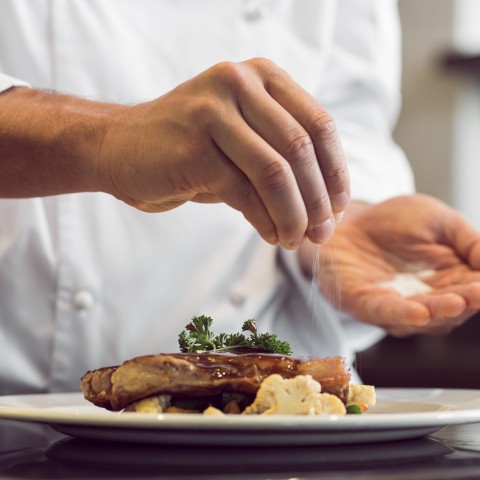 When learning a new language, vocabulary is—almost—everything. That’s because when speaking with a foreigner in his or her language, people don’t usually mind if that person doesn’t talk with perfect grammar, and will understand them anyway.
When learning a new language, vocabulary is—almost—everything. That’s because when speaking with a foreigner in his or her language, people don’t usually mind if that person doesn’t talk with perfect grammar, and will understand them anyway.
But if you don’t know an important word, communicating will be a problem.
And nouns are the most important words of all. So, what are the Italian nouns you should learn while studying Italian? Check out our list here on ItalianPod101.
But first, some information on Italian nouns’ gender!
 Table of Contents
Table of Contents
- Italian Nouns: Masculine and Feminine
- The 100 Most Common Italian Nouns
- Learn Italian at Your Pace with ItalianPod101
1. Italian Nouns: Masculine and Feminine
 First things first: How many genders are there in Italian?
First things first: How many genders are there in Italian?
In the Italian language, nouns are masculine or feminine. There is no neuter gender.
For people and animals, the gender of their noun is determined by their sex. For example:
- Il maestro / la maestra “the male teacher” / “the female teacher”
- Il cavallo / la cavalla “the horse” / “the mare”
However, there are nouns that don’t change in masculine or feminine form. For example:
- Insegnante “Teacher”
- Autista “Driver”
For things, their gender is conventional. For example:
- Il mare: “The sea” [Masculine]
- La luna “The moon” [Feminine]
- Il bicchiere “The glass” [Masculine]
- La tazza “The cup” [Feminine]
In general (but there are exceptions), these types of nouns in Italian are masculine:
- Months and days
- Trees
- Wines
- Seas, rivers, lakes, and mountains
In Italian, feminine nouns tend to be in these categories (again, there are exceptions):
- Fruit
- Disciplines (such as philosophy, science, math…)
- Continents, states, regions, cities, and islands
There are masculine and feminine nouns in Italian in many other categories. For example:
- Plants
- Vegetables
- Sports
- Body parts
Now, let’s explore the most important Italian nouns and articles you should know.

2. The 100 Most Common Italian Nouns
 Here are the 100+ most common Italian nouns you should learn when you start studying Italian.
Here are the 100+ most common Italian nouns you should learn when you start studying Italian.
1- The Most Common Italian Nouns for Appliances
Check out these Italian nouns for appliances, with their translation and an example of use:
- Televisione — “Television” [f.]
- La mia televisione è rotta. “My television is broken.”
- Frigorifero — “Fridge” [m.]
- Se hai fame, c’è della pasta nel frigorifero. “If you’re hungry, there’s pasta in the fridge.”
- Condizionatore — “Air conditioner” [m.]
- Ho caldo, accendiamo il condizionatore? “It’s hot, can we turn on the air conditioner?”
- Lavatrice — “Washing machine” [f.]
- Non dovresti lavare questo vestito in lavatrice. “You shouldn’t wash this dress in the washing machine.”
- Microonde — “Microwave” [m.]
- La cena è nel microonde. “Dinner is in the microwave.”
- Phon — “Hairdryer” [m.]
- D’estate non uso mai il phon. “I never use the hairdryer in the summer.”
- Ventilatore — “Fan” [m.]
- Stanotte era così caldo che ho dormito con il ventilatore acceso. “Tonight it was so hot that I slept with the fan on.”
- Caldaia — “Boiler” [f.]
- Abbiamo appena cambiato la caldaia. “We’ve just changed the boiler.”
- Lavastoviglie — “Dishwasher” [f.]
- Non potrei vivere senza lavastoviglie. “I couldn’t live without a dishwasher.”
- Forno — “Oven” [m.]
- La pizza è nel forno. “The pizza is in the oven.”
2- The Most Common Italian Nouns for Technology
Some very common Italian nouns for tech are:
- Computer — “PC” [m.]
- Ho comprato un nuovo computer. “I’ve bought a new PC.”
- Computer portatile — “Laptop” [m.]
- Questo computer portatile è molto leggero. “This laptop is very light.”
- Cellulare — “Mobile phone” [m.]
- Marco passa troppo tempo sul cellulare. “Marco spends too much time on his mobile phone.”
- Cuffie — “Headphones” [f.]
- Ho dimenticato le cuffie in palestra. “I forgot my headphones at the gym.”
- Caricabatterie — “Charger” [m.]
- Mio figlio ha perso il caricabatterie. “My son lost his charger.”
- Connessione — “Connection” [f.]
- La connessione qui è lenta. “The connection here is slow.”
- Tastiera — “Keyboard” [f.]
- Non so scrivere con la tastiera QWERTY. “I can’t write with a QWERTY keyboard.”
- Schermo — “Screen” [m.]
- Lo schermo è ad alta risoluzione. “It’s a high-resolution screen.”
- Tasto — “Button”; “Key” [m.]
- Se sei pronto a procedere, premi il tasto di controllo. “If you’re ready to proceed, please press the control key.”

3- The Most Common Italian Nouns for Transportation
 Here are some essential Italian nouns about transportation:
Here are some essential Italian nouns about transportation:
- Aereo — “Plane” [m.]
- L’aereo partirà da Milano Malpensa. “The plane will depart from Milano Malpensa.”
- Autobus — “Bus” [m.]
- È questo l’autobus per il Colosseo? “Is this the bus to the Colosseum?”
- Auto — “Car” [f.]
- Non amo viaggiare in auto. “I don’t like traveling by car.”
- Treno — “Train” [m.]
- Il nostro treno è in ritardo. “Our train is late.”
- Stazione — “Train station” [f.]
- Per la stazione, gira a destra. “At the train station, turn right.”
- Aeroporto — “Airport” [m.]
- Questo aeroporto è enorme. “This airport is huge.”
- Fermata — “Stop” [f.]
- Devi scendere alla prossima fermata. “You have to get off the bus at the next stop.”
- Biglietto — “Ticket” [m.]
- Il biglietto costa un euro. “The ticket is one euro.”
- Incrocio — “Intersection” [m.]
- Al prossimo incrocio, gira a sinistra. “At the next intersection, turn left.”
- Semaforo — “Traffic light” [m.]
- Fermati! Il semaforo è rosso. “Stop! The traffic light is red.”
4- Common Italian Nouns at the Restaurant
Now, here are some of the most basic Italian nouns you should remember at the restaurant:
- Tavolo — “Table” [m.]
- Vorremmo un tavolo vicino alla finestra, per favore. “We’d like a table next to the window, please.”
- Forchetta — “Fork” [f.]
- Potrei avere un’altra forchetta? “Could I have another fork?”
- Coltello — “Knife” [m.]
- Questo coltello è molto affilato. “This knife is very sharp.”
- Cucchiaio — “Spoon” [m.]
- Mi dai un cucchiaio, per favore? “Can you give me a spoon, please?”
- Conto — “Bill” [m.]
- Vorrei il conto, per favore. “I’d like the bill, please.”
- Acqua — “Water” [f.]
- Bevo solo acqua perché devo guidare. “I only drink water, because I have to drive.”
- Birra — “Beer” [f.]
- Qual è la migliore birra italiana? “Which is the best Italian beer?”
- Vino — “Wine” [m.]
- Qual è il tuo vino preferito? “Which is your favorite wine?”
- Verdure — “Vegetables” [f.]
- Vorrei un contorno di verdure. “I’d like some vegetables on the side.”
- Piatto — “Plate”; “Dish” [m.]
- Ho mangiato un enorme piatto di pasta. “I had a huge dish of pasta.”
- Cameriere/a — “Waiter” [m. and f.]
- Il cameriere è stato molto gentile. “The waiter was very kind.”
- Cuoco/a — “Cook” [m. and f.]
- Mi sarebbe piaciuto fare il cuoco. “I would have loved to be a cook.”

5- Italian School and Education Nouns
Here are some great Italian nouns to learn if you plan on schooling in Italy, or know someone who does!
- Scuola — “School” [f.]
- Sono andata a scuola in Inghilterra. “I went to school in England.”
- Scuola elementare — “Elementary school” [f.]
- Quella è la scuola elementare di mia figlia. “That is my daughter’s elementary school.”
- Scuola media — “Secondary (middle) school” [f.]
- La scuola media è un periodo importante per i ragazzi. “Secondary school is an important period for kids.”
- Scuola superiore — “High school” [f.]
- La mia scuola superiore era in un’altra città. “My high school was in another town.”
- Liceo — This is a high school that prepares students for university, as opposed to a professional high school, preparing them for work. [m.]
- Al liceo non ero bravo in matematica. “I wasn’t good at math in high school.”
- Università — “University” [f.]
- Ho conosciuto mia moglie all’università. “I met my wife at university.”
- Insegnante — “Teacher” [m. and f.]
- L’insegnante di inglese di Lucia è bravissima. “Lucia’s English teacher is very good.”
- Studente — “Student” [m. and f.]
- Sono molto orgoglioso dei miei studenti. “I’m really proud of my students.”
- Classe — “Class” [f.]
- Nella mia classe ci sono più ragazze che ragazzi. “In my class there are more girls than boys.”
- Laurea — “Degree” [f.]
- Ho una laurea in ingegneria meccanica ottenuta all’Università di Bologna. “I have a degree in mechanical engineering obtained at the University of Bologna.”
- Diploma — “Diploma” [m.]
- Ho preso il diploma nel 1994. “I got my diploma in 1994.”
6- Italian Nouns for Jobs and Occupations
Here’s an Italian nouns list for jobs and occupations, so you can better talk about your work!
- Medico — “Doctor” [m. and f.]
- C’è un medico? “Is there a doctor?”
- Avvocato/a — “Lawyer” [m. and f.]
- Mia figlia è un’avvocata molto brava. “My daughter is a very skilled lawyer.”
- Infermiere/a — “Nurse” [m. and f.]
- L’infermiere è di turno stamattina. “The nurse is on duty this morning.”
- Capo/a — “Boss” [m. and f.]
- Il capo è cattivo e arrogante. “The boss is mean and arrogant.”
- Imprenditore / Imprenditrice — “Businessman” / “Businesswoman”
- Mio zio è un ricco imprenditore. “My uncle is a wealthy businessman.”
- Poliziotto/a — “Policeman” / “Policewoman”
- Da bambino volevo fare il poliziotto. “When I was a child, I wanted to be a policeman.”
- Vigile del fuoco — “Fireman” / “Firewoman”
- I vigili del fuoco sono molto coraggiosi. “Firemen are very brave.”
- Ingegnere — “Engineer” [m. and f.]
- Gli ingegneri lavorano molto. “Engineers do a lot of work.”
- Impiegato/a — “Clerk” [m. and f.]
- Questa impiegata non lavora mai. “This clerk never works.”
- Commesso/a — “Shop assistant” [m. and f.]
- I commessi lavorano spesso di domenica. “Salesmen often work on Sundays.”
- Professore / Professoressa — “Professor” [m. and f.]
- Mio padre è professore di letteratura italiana. “My father is an Italian literature professor.”

7- Common Italian Nouns for Family Members
Now for some examples of Italian nouns you’ll need to talk about your family:
- Famiglia — “Family” [f.]
- La famiglia è tutto per me. “Family is everything for me.”
- Madre — “Mother” [f.]
- Mia madre lavora come insegnante. “My mother works as a teacher.”
- Padre — “Father” [m.]
- Tuo padre è davvero simpatico. “Your father is really nice.”
- Genitori — “Parents” [m.]
- I miei genitori vivono a Roma. “My parents live in Rome.”
- Marito — “Husband” [m.]
- Sto aspettando mio marito. “I’m waiting for my husband.”
- Moglie — “Wife” [f.]
- Mia moglie ha due anni più di me. “My wife is two years older than me.”
- Figlio — “Son” [m.]
- Ho un figlio di 12 anni. “I have a 12-year-old son.”
- Figlia — “Daughter” [f.]
- Tua figlia va all’università o lavora? “Is your daughter studying at university or working?”
- Nonni — “Grandparents” [m.]
- Ho passato molto tempo con i miei nonni da bambino. “As a child, I spent a lot of time with my grandparents.”
- Nonno — “Grandfather” [m.]
- Mio nonno è stato un grande maestro per me. “My grandfather was a great teacher for me.”
- Nonna — “Grandmother” [f.]
- Mia nonna adora ballare. “My grandmother loves dancing.”

8- Italian Nouns for Body Parts
Learn the most important nouns for body parts in Italian:
- Corpo — “Body” [m.]
- I ballerini hanno corpi slanciati. “Dancers have slender bodies.”
- Occhio — “Eye” [m.]
- Gli occhi blu sono stupendi. “Blue eyes are gorgeous.”
- Orecchio — “Ear” [m.] [Strangely enough, when plural this noun becomes feminine.]
- Le orecchie di Dumbo sono giganti. “Dumbo’s ears are huge.”
- Testa — “Head” [f.]
- Mi fa male la testa. “My head hurts.”
- Spalla — “Shoulder” [f.]
- Marta ha un tatuaggio sulla spalla sinistra. “Marta has a tattoo on her left shoulder.”
- Braccio — “Arm” [m.] [When plural, it becomes feminine.]
- Mi ha presa tra le braccia e mi sono innamorata. “He took me in his arms and I fell in love.”
- Petto — “Chest” [m.]
- Il dolore al petto può essere sintomo di infarto. “Chest pain could be a symptom of a heart attack.”
- Pancia — “Stomach” [f.]
- Ha una grande pancia rotonda. “He’s got a big, round stomach.”
- Schiena — “Back” [f.]
- Mio marito ha dei problemi alla schiena. “My husband has back problems.”
- Gamba — “Leg” [f.]
- Mi sono rotto una gamba cadendo dalle scale. “I broke a leg by falling from the stairs.”
9- Most Important Italian Nouns for Time

- Oggi — “Today” [m.]
- Oggi è un giorno importante. “Today is an important day.”
- Ieri — “Yesterday” [m.]
- Ieri sono andato al cinema. “Yesterday I went to the cinema.”
- Domani — “Tomorrow” [m.]
- Laura arriverà domani mattina. “Laura will arrive tomorrow morning.”
- Lunedì / martedì / mercoledì / giovedì / venerdì / sabato / domenica — “Monday” / “Tuesday” / “Wednesday” / “Thursday” / “Friday” / “Saturday” / “Sunday” [All masculine except domenica, which is feminine.]
- Mercoledì lavoro, mentre giovedì sono di riposo. “On Wednesday I’m working, while on Thursday I’m off.”
- Giorno — “Day” [m.]
- Che giorno è oggi? “Which day is today?”
- Settimana — “Week” [f.]
- Tornerò tra una settimana. “I’ll be back in a week.”
- Mese — “Month” [m.]
- Il mese prossimo ho un esame. “I have a test next month.”
- Anno — “Year” [m.]
- Quest’anno ho viaggiato molto. “I’ve traveled a lot this year.”
- Ora — “Hour” [f.]
- Tra un’ora sarò a casa. “I’ll be home in an hour.”
- Minuto — “Minute” [m.]
- Aspetta un minuto. “Wait a minute.”
3. Learn Italian at Your Pace with ItalianPod101
We hope you enjoyed learning the top 100+ Italian nouns with us! Did you learn any new words? Let us know in the comments!ItalianPod101 allows you to learn Italian at your own pace, thanks to our apps and lessons which are available to you whenever you want and wherever you are. Improve your vocabulary and grammar, and learn Italian while you have fun!
With your hard work and our practical learning tools, you’ll be on your way to mastering Italian before you know it!










